Madness does not run through the theatre family; it gallops. With sardines. And while you’re certainly not going to get a gargantuan house on the postage stamp stage at The Audrey Herman Spotlighters Theatre, you can definitely get a hilariously good time with their current production of Charles Morey’s Laughing Stock. Mild to moderate insanity with a dash of ‘WTF’ all balled neatly into the nonsense that is the lifestyle we choose when we jump into the world of theatre. (And don’t worry, you non-theatre people, it’s still a functional, comedic experience that you’ll never forget a parade of nonsense that will prove to you we’re all nuts.) Directed by Erin Klarner, this charming bit of stuff-n-fluff nonsense will give you the chuckles. Unless you’re of the theatre world, in which case, it will leave you in stitches.
The problems with this one are few— predominantly the length of Charles Morey’s script and largely that he fails to follow the crescendo-build structure of “funny, funnier, funniest” in the way he breaks apart the acts/scenes. You get the action-packed hilarity in the middle bit with a simmering denouement of milquetoast-iness, which I recognize is Morey’s attempt to wrap up the metaphor of the whole ‘summer stock’ experience in this layout but if it’s going to be that wordy and drawn out…the last section cannot be as dry as it is. There are some minor pacing issues in the way the initial “meet and greet” once the “company” comes together in the beginning, but as they fall into step with the run of the production, I suspect that will tighten. And there still seems to be the consistent issue (ubiquitously across the theatrical boards of Baltimore and beyond) that certain more intimate, more emotional scenes are not being played at an appropriately projected volume. A whispered scene needs to have the intention and emotion of a whisper but the volume capacity to be heard by everyone in the house. There’s a slight yen for some more sound effects/cover music for those earlier scenic changes but it’s not such a detracting absence that you feel cheated out of an aural experience. Those issues aside, the production is a rollicking romp all through the chaos and calamity that is a ‘theatre family’ experience while a company bangs its way through a season’s rep of shows.
No book reports here, but it should be noted that the show does in fact have three separate meta show-within-a-show productions happening. This is a play about a theatre company, after all. And while you don’t need to know the archaic farce of Charlie’s Aunt, the riveting Dracula, or the tragedy Hamlet, you’ll get more of the jokes and references if you do. (And for the love of all things theatrical do not have a melt-down if you discover how Hamlet ends by watching this production of Laughing Stock.)
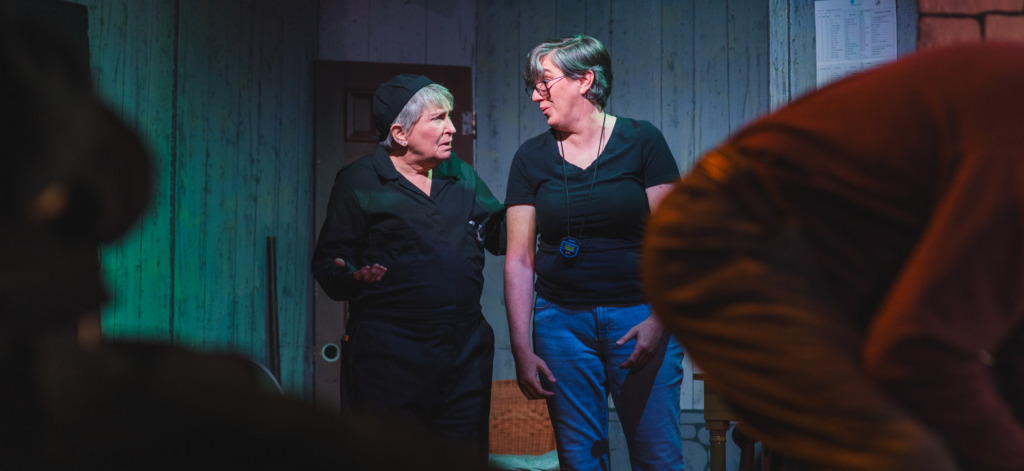
Director Erin Klarner has done an impressive job with pulling together a company of 14 performing actors (plus the Props Mistress, Emma Hawthorne, who wands in and out of the scenes silently for added tomfoolery) and getting them to not only put on a play but to vibe and gel with all of the quirks and antics of a company in rep for a summer season. There is this special…bonded vibe… you get when you’re in that situation and Klarner captures it among her cast divinely. For the most part, she keeps the production’s overall pace clipping along (and it’s a good thing because this play is lengthy enough as is) and makes solid use of the unique staging space at Spotlighters. There’s one instance— a verbal spat between Craig, Henry, and Gordon— where the somewhat important interaction between these three characters feels cut off from a large portion of the audience because of the way they’re blocked into the vom behind the pilar, but that aside, you never feel like you’re losing action to the problematic blocking obstacles that the Spotlighters’ stage presents. Klarner works the space well (sparingly designed by Rob Books, but that only lends itself to the charm because it is meant to be this ‘rustic’ barn interior with all the trappings and frills, or lack-there-of, of a no-budget theatre) and gets maximum chuckles from the audience because of her finessing of the way certain scenes are physically handled in the space— particularly the one with ‘the skull’ near the end of the show.
For as many nonsense moments and great opportunities to bust a gut laughing as there are in this production, Klarner does an extraordinary job of encouraging performers (for whom this is applicable) to come down into those more sincere moments of emotional truth and play them in earnest. (If only we could hear more of them!) The design team— Amy Rudai on costumes, Eric Gasior on lights, Rob Books on set, Emma Hawthorne on props— support Klarner’s overall vision for the production in delightfully humorous ways. You get some crazy lighting cues, particularly during one of the scenes when Mike Papa’s character is trying to narrate bits from “knock-off-Dracula.” And again when the ‘brides of Dracula’ strike a certain pop-culture pose. Rudai’s costumes feel like they came out of the back of a costume room in a community theatre, which is the perfect fit for this production, and some of the quirky and ridiculous props that Emma Hawthorne appears with have that feeling of “things that have been lying around for far too long backstage.” It really is a play about theatre people for theatre people and the more of a theatre people you are, the more fun you’re going to have.
The three stooges— Karma, Braun, and Ian (Emma Shannon, BJ Darden, and Bill Kohlhoff, respectively)— become some of the physically comedic gold in this production, particularly when failing beyond reason to get the ladder through the door. You get a nicely balanced bombacity from Henry (Carlo Olivi) as well; he’s the production designer with all of the incredulous outbursts of anyone I’ve known to bear that title in a production. You get limited interaction with Shannon, Darden, and Kohlhoff and some of the other more featured characters, but that ladder moment with Carlo Olivi is hysterical. Darden, as Braun, who lives up to his namesake while lacking someone in the brains department, has a hilarious sense of stage presence, particularly when it comes to serving tea. Or being doors.
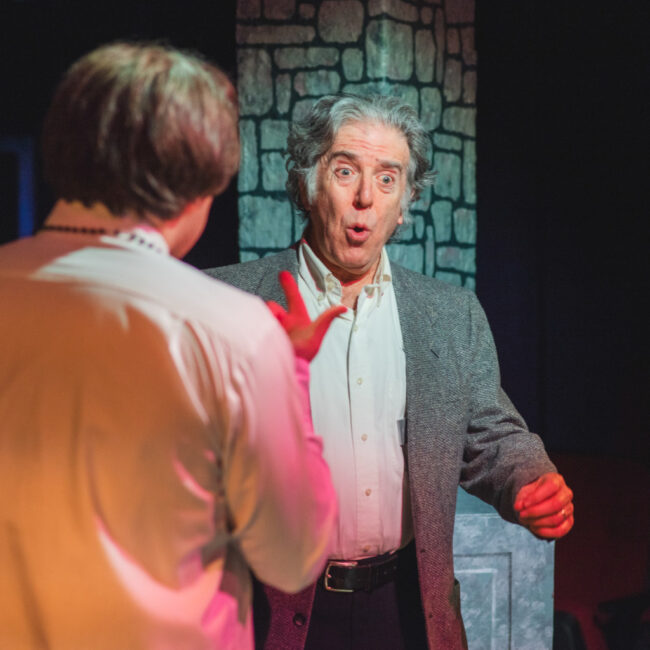
Paired up as the old seasoned salts of the troupe, Richfield Hawksley (Nathan Rosen) and Daisy Coates (Danae Nick) give us the epitome of what ‘the old guard’ and ‘the way it was’ constantly waxing nostalgic for all things from ‘their day.’ Nick has well-timed, quippy responses, particularly when attempting that absurd ‘animals at the waterhole’ exercise that Director Susannah (Audrey Brooks) throws at them. Brooks has the role nobody wants, everybody loves to hate, and she was so good at being this terribly-overly-artsy-director type that during that animal-exercise (that we all tried to repress from acting 101) I wanted to morph, explore my inner lynx, leap onto the stage, and tackle her into oblivion. Rosen, who takes up the role of the aged company member whose played a certain role far too many times over the decades, is quite the comic crack-up during the Dracula-knock off, being that hilariously obstreperous actor who cannot remember the changes, forgets things, and causes generalized calamity because he can’t even be fed the lines or gestures as his co-stars are flailing all around them. (For clarification this is written into the character this way and Rosen does an excellent job of playing that up, making it all the more hilarious.)
It’s the working relationships of these people on the stage with one another that makes the show so enjoyable. The chaos and camaraderie because all of these people playing these actors have all been there in a show just like this and lived these experiences. And the sense of choreographed insanity that Erin Klarner has brought to the forefront of the production, particularly all during the Dracula-knock off scenes.
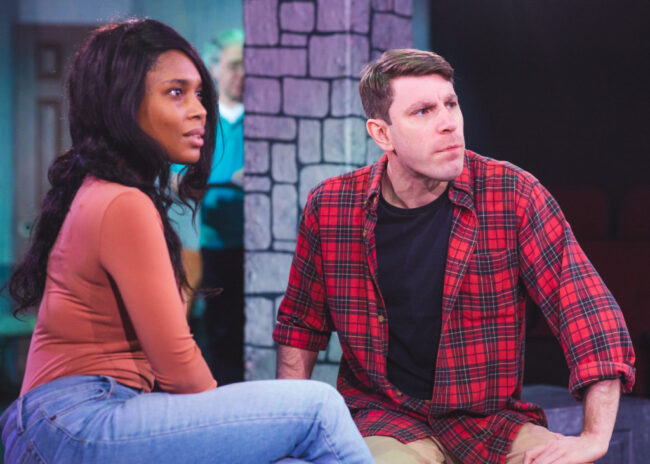
While Klarner may be teaching her actual cast about relationships and dynamics and how to really make a show a success, the playwright is using the characters of Mary (Chelsey Mitchell) and Tyler (Andy Belt) to teach the world about showmances! When you first encounter the Mary character, she’s overeager, sexed-up-six-ways-to-Sunday, and just a hilarious hot mess. And Andy Belt’s Tyler is that one actor who has to argue with the director every blessed step of the way, asks a million questions about motivation and blocking, and drives everyone up a tree, over the cliff, and absolutely nuts with his asinine insistence. And the pair are hilarious together. Mitchell’s Mary becomes ‘Mina’ in Dracula-knock off scenes and Belt’s Tyler of course the titular vampire. And they’re both wild. Belt has an astonishing hold on that vampiric accent and his body language and facial expressions are just to die for. Mitchell is similarly gifted in her reactive, responsive facial expressions, especially when cues get missed, lines get flubbed, and it all starts to go pear-shaped.
Mike Papa cruises into the scene as the ‘suave-but-jaded’ Vernon. Way too old and way out of favor so summer stock is all Vernon has left, Papa is nailing this role with gusto. There’s this savage sense of ego but also a little humility and excellent comic timing to his portrayal. You get a sharp juxtaposition against Will Beckstrom’s Jack Morris character, who is far more subdued but has all of the eager desires to succeed in acting that one might imagine a young Vernon once possessed. Both are excellent in their scenes during the Dracula-knock off and they share several scenes together, having earnest conversations that feel and sound a lot like ones I’ve often had with co-stars in my own company.
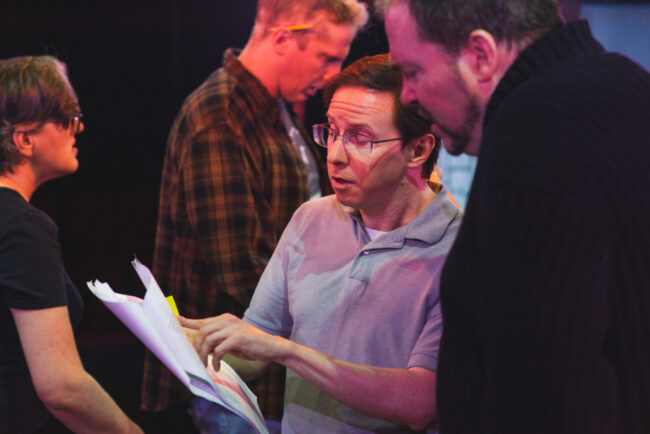
If you want a scene-stealing fire-cracker in this zany production, Rick Moranis Nik Henle is your guy. Playing ‘Cranky Craig’ the production manager— you know, the guy in charge of bathrooms, bookkeeping, and budget?— Nik Henle is going to give you laughs for miles in this role. Starting off like a flaky dry dustbowl, you’re blown out of the water when Henle erupts into this caustic tirade about— of all things— pencils. He’s animated, he’s hyperintense, and he’s just insane. And we’ve all worked with that one production manager and Henle captures the epitome of that hands down, no question. There’s honest levels to his character— it’s either a two or a twelve with very little happening between those two modes— but they are so deeply satisfying to watch in action, you almost wish there was more of the Craig character fitted into the production.
Sassy, razor sharp, hilarious, and all-round Whackadoodle-good-time-gal Sarah McKay is rolling to vibrant life in the skilled hands of Jen Sizer. Sarah is the stage manager for ‘the company’ and the irony of Sizer being in that role is lost on nobody. What’s truly remarkable about Sizer’s performance isn’t all of her madcap antics with the drinking, the ‘morph-exit’ during Dracula-knock off, or her overall zippy sense of comic timing, but rather her heartfelt moments of emotional discovery. These moments are all shared with Gordon (Todd Krickler) and they all have such a deeply profound emotional depth that just for a moment you forget you’re watching high hilarity.
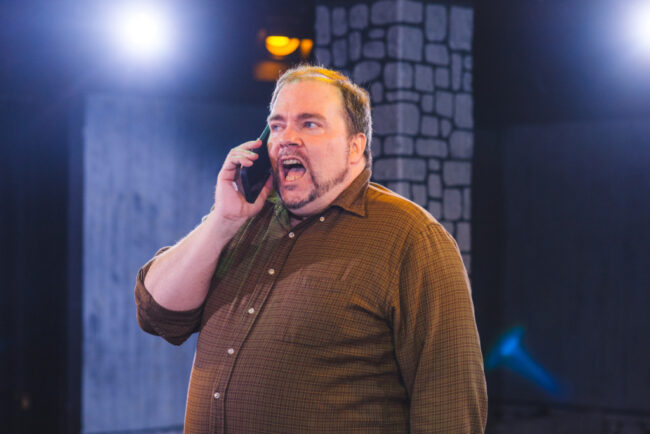
Krickler is that artistic director who is just all over the place. A true master of faux-phone conversations, thanks to his brilliant portrayal I’m seriously convinced there’s a Mrs. Whatsherface on the other side of that phone conversation. He’s responsive, reactive, good with comic delivery and timing and what’s more, he cuts a pretty damn decent Hamlet in those moments where he drifts idly into the gravitas of the character his character is emulating. Krickler holds his own against the talented cast while serving as their ringleader and really brings this all-round sense of “theaterness” (for lack of a better word…it’s late…I’m tired…) to his portrayal and you get the feeling that he really could be the artistic director for some ‘barely-breaking-even-trying-not-to-collapse-older-than-the-barn-its-housed-in summer stock theatre.’
It’s a roaring good time; you’ll love it so much more if you are a theatre person. But even if you aren’t you’ll have a grand laugh and an excellent night out; catch Laughing Stock at Spotlighters before their “Auld Lang Syne” night (which is Sunday 3/17/24.)
Running Time: 2 hours and 40 minutes with one intermission
Laughing Stock plays through March 17th 2024 at The Audrey Herman Spotlighters Theatre— 817 Saint Paul Street, Baltimore MD. For tickets call the box office at (410) 752-1225 or purchase them online.
